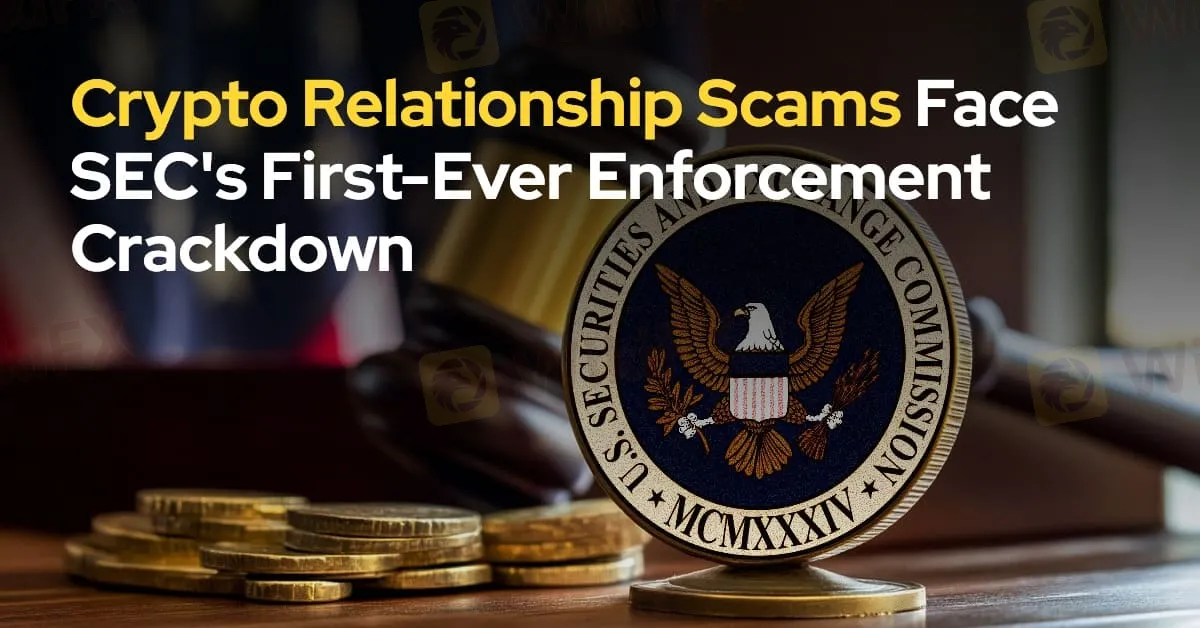Crypto Relationship Scams Face SEC's First-Ever Enforcement Crackdown
Abstract:The Securities and Exchange Commission (SEC) has initiated its first enforcement actions against crypto-related relationship scams, marking a significant step in combating this growing form of investment fraud.

In a groundbreaking move, the Securities and Exchange Commission (SEC) has initiated its first enforcement actions against crypto-related relationship scams, marking a significant step in combating this growing form of investment fraud. The SEC accused criminals of defrauding millions of dollars from investors through two separate schemes, which operated via social media platforms such as WhatsApp, LinkedIn, and Instagram. The fraudulent schemes were connected to fake cryptocurrency trading platforms NanoBit and CoinW6.
Crypto relationship scams have increasingly become a prevalent type of investment fraud involving popular cryptocurrencies like Bitcoin and Ethereum. These scams typically exploit the anonymity and decentralized nature of cryptocurrency transactions, making it easier for criminals to operate undetected. The speed of irreversible transactions and the ability to move money globally further facilitate these scams, according to the Federal Bureau of Investigation (FBI).
The SECs actions highlight the growing threat posed by such schemes, where criminals establish connections with unsuspecting victims through social media and messaging platforms, gradually building trust before introducing fraudulent investment opportunities. One of the victims, identified only as Jules, shared her experience of being lured into a scam. She described how, after weeks of regular communication with a man she met online, he began to introduce the idea of investing in Bitcoin. Initially hesitant, she eventually took out personal loans to fund her investments. What started with a small amount of around $1,000 quickly escalated into much larger sums.

Jules is not alone in falling victim to these scams. Kim Casci-Palangio, head of the romance scam recovery group at the Cybercrime Support Network, noted that the financial losses tied to these types of fraud can be enormous. Many victims, like Jules, are convinced to invest substantial amounts of money based on the trust they develop with scammers over time.
The SECs enforcement actions against NanoBit and CoinW6 signal a new era of regulatory scrutiny on crypto-related scams. While the decentralized nature of cryptocurrencies has made it difficult to trace fraudulent activities in the past, authorities are now stepping up efforts to hold criminals accountable.
The SECs focus on these types of schemes emphasizes the need for investors to exercise caution when engaging with online platforms, especially when dealing with digital assets. In response to the rising number of scams, experts are urging individuals to verify the legitimacy of any investment opportunities and avoid sharing personal financial information with people they meet online.
As the cryptocurrency industry continues to grow, regulatory bodies like the SEC are intensifying their efforts to protect investors from fraud. The enforcement actions taken in these cases could set a precedent for future crackdowns on crypto-related scams, offering some level of protection to those who may be vulnerable to these schemes.

Read more

Cryptocurrency Money Launderer Sentenced to Over 10 Years for Laundering $20 Million in Criminal Fun
An Indian national exposed laundering $20M via cryptocurrency and Hawala networks, revealing intricate money laundering techniques.

$TRUMP Token Soars: A New Era for Trump and Cryptocurrency?
Donald Trump has taken an unexpected step into the cryptocurrency market ahead of his January 20 inauguration by launching a memecoin named $TRUMP. The announcement sparked significant speculation and trading activity, with the coin’s value skyrocketing within hours of its debut.

Crypto.com’s Dual Front Battle: European Progress and U.S. Regulation
Crypto.com has received conditional approval to operate under the European Union’s Markets in Crypto-Assets (MiCA) framework. Once fully licensed, this will enable the company to serve customers throughout the EU under a standardised set of rules.

Boerse Stuttgart Digital Secures EU-Wide MiCAR Crypto License
Boerse Stuttgart Digital secures Germany’s first MiCA license, enabling EU-wide operations and expanding its digital asset services.
WikiFX Broker
Latest News
Will Gold Prices Continue to Rise Due to Trump’s Tariffs?
Miami Firm Owner Pleads Guilty to $6M Ponzi Scheme Fraud
NBI Cebu Arrests Forex Trader for Illegal Investment Solicitation
PU Prime's "Feather Your Trades" Contest! Begin
eToro Files for IPO with $5 Billion Valuation on NASDAQ
Is FizmoFX a Scam? Fraud and Account Suspension of Traders
IG Japan Extends US Stock CFD Trading Hours in 2025
ALERT! Warning against Livaxxen
Which Zodiac Sign Makes the Best Trader?
Vanguard Settles $106M SEC Case Over Misleading Investors
Rate Calc

